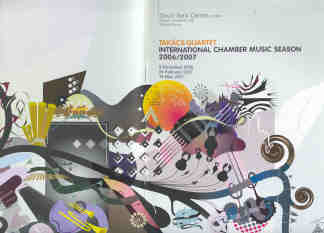

 |
 |
|
| Dvořák , Shostakovich and Brahms  Takács Quartet with Stephen Hough (piano) Queen Elizabeth Hall, London May 18, 2007 The Takács Quartet [Edward Dusinberre & Károly Schranz (violins), Geraldine Walther (viola) & András Fejér (cello)] represents string quartet playing at today's expected high level of accomplishment, and they pleased their large audience by beginning with the most popular of Dvořák’s string quartets; people know what they like and like what they know... The many others are likely to be encountered rarely, at Wigmore Hall sometimes, and in CD "Intégrales" - they deserve wider familiarity. Shostakovich’s short 11th quartet made less of an impression, but it was the Brahms piano quintet which many of us may have come particularly to hear. One of my favourites in the piano/strings repertoire, it received a performance of assured technical achievement, but was curiously uninvolving. There was an unexpected lack of depth in the sound of Stephen Hough's fluent account as heard from near-front on the keyboard side of his Steinway; pianos usually sound better the other side, where one cannot watch the fingers... Perhaps in older age one inevitably looks back to the tension and feeling of strain overcome conveyed by benchmark artists of old; mine is Serkin with the Busch Quartet; follow that link to sample them in it.
Gyorgy Ligeti Self-portrait with Reich and Riley (and Chopin in the background) ; Chamber Concerto; Aventures & Nouvelles Aventures John Constable piano London Sinfonietta/Martyn Brabbins 19 May 2007, Queen Elizabeth Hall, London
Gyorgy Ligeti's short, mostly quiet, duo-piano piece with a long title was played imperturbably by Constable and Sutherland, who made light of the intricacies of his 'mobile key blockage' technique and brought us close to Chopin's B minor presto at the end. Reich's Sextet for percussions and keyboard players was less exciting (to my old ears) than it would have been if the sound had not been dissipated by amplification, which seems to have a main purpose to ensure commensurate applause; it raised the house, as they say. The QEH has intimidating banks of loud speakers left and right, but nothing central, so the Sound Intermedia engineer explained to me. From his vantage point, centre back stalls, he doubtless achieved good balance; but less than a dozen seats to his left, most of the music emerged from the speakers that side. Not to belittle the pleasure of seeing percussionists in action, only a small proportion of the audience would have heard the players on stage as the main source of what they were listening to, this seriously undermining the impact of the music (volume does not directly equate with impact) despite - so I was assured - the composer's predeliction for amplification, although such is not indicated in Reich's detailed notes in the programme and was surely unnecessary in a medium-sized concert hall like QEH? Aventures & Nouvelles Aventures After resting our ears with a second interval in this three-decker concert, amplification was eschewed by the three marvellous exponents of Ligeti's astonishing and totally enthralling anti-operas. Twenty minutes of controlled mayhem by the heroic trio held us in rapt attention. The incongruity of over-the-top 'operatic' gesture and wordless vocalisation was enhanced by page turning, reminding us that nothing is improvised. Ligeti's invented language, with accompanying ritualised expression of a whole range of emotions, is precisely prescribed and notated in the composer's 'a-semantic emotional artificial language'. A small group of instruments complete and highlight the human sounds, the percussion department with a multitude of props which produce their appropriate sounds at key moments. The whole programme, whose rehearsal demands must have been colossal, cries out for filming and a DVD. Further concert performance opportunties must be restricted and I trust that possibility has not been lost on the promoters, not least so that those potential attenders daunted by the Cup Final crowds at the new Wembley stadium could catch up on what they missed, fearing another type of mayhem on their journeys... Peter Grahame Woolf For a fuller in-depth-review of this special concert, do read also Anne Ozorio in Music Web.
|